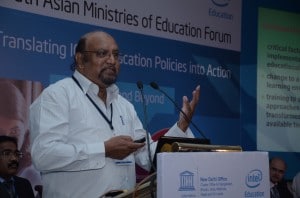 The education system needs to be made diverse to cater to the different needs to different students and teachers in every area, says Prof (Dr) Louis Vernal, Member – National Council for Teacher Education (NCTE), Western Region; Education Consultant – Learning Links Foundation Delhi, Sarva Shiksha Abhiyan Goa, in conversation with Ruhi Ahuja Dhingra
The education system needs to be made diverse to cater to the different needs to different students and teachers in every area, says Prof (Dr) Louis Vernal, Member – National Council for Teacher Education (NCTE), Western Region; Education Consultant – Learning Links Foundation Delhi, Sarva Shiksha Abhiyan Goa, in conversation with Ruhi Ahuja Dhingra
What is your view of the education system in India? Where are we lacking?
It is very difficult to talk about the education system in one word because it is very large. The first thing that we need to realise is that we cannot have a unified policy or a system of education. Education has to be diversified because there are different needs of different areas, and different levels of students and teachers everywhere. We should have a policy, but the implementation has to be done step-by-step, according to the stage of development in a particular state.
On the other hand, there are large and very positive signs of improvement. The government has realised the importance of education. Over 12 percent of the 12th Five-Year Plan is being spent on education. There is also a huge amount of money for infrastructure, education and communication. In the next five years, the situation would be much better than what it is today. The government has done a fairly good job in the Right to Education, and Sarva Shiksha Abhiyan. We need to get more private players into the system.
What according to you should be the focus of the policy makers and the stakeholders?
So far, the policy has been more unified: one particular syllabus, one particular curriculum and one particular way of teaching. And now, there is diversity in the students and teachers. So there is a much more diversified way of teaching-learning today. Technology contributes in a big way to help them and it also promotes self-learning which is very important because children may be in school for 10-12 years, but there is a whole life of learning after that.
How can ICT in education reach the backward areas and help us overcome the geographical barriers?
There are various definitions of backward for geographical distributions. You have to reach out to them. To go through the painful process of first providing access, we are slowly paving our way towards excellence. But it is an impossible task to excel in every area. So, the target should be to cover the disadvantaged areas, but not in the same manner as the developed areas. They should be brought into the mainstream and slowly provided facilities. Students are intelligent everywhere and will themselves come up to the level.
Success is the starting point: success and excellence cannot start together. One of the best ways of crossing the barrier between the privileged and the underprivileged is through education. Around 940 million people use mobile connectivity in India. The connectivity is going up in rural areas, which is a good sign. With good connectivity also come advancements in educational programmes.
How can we empower the teachers and make them come at par with students in the use of technology?
We need to revamp the training programmes for teachers. The teacher can acquire knowledge on his own, but skills training is very important. The focus should be on teachers acquiring various creative, innovative, communication and livelihood skills, and once the teacher feels empowered, he can get rid of his fears and handle diversity. And unless the teacher knows how to handle diversity, he will only feel inferior. The focus has changed from ‘what to learn’ to ‘how to learn’.






















